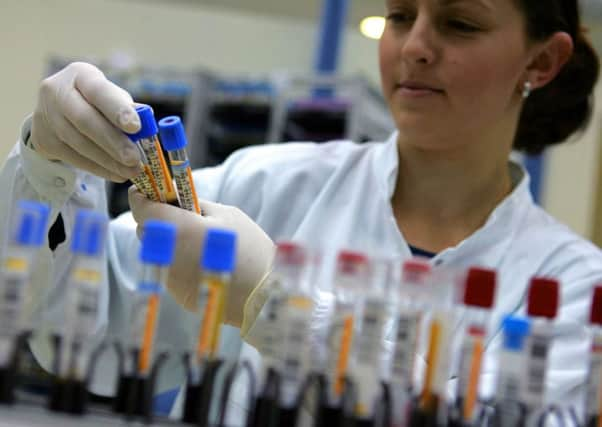Positive moves provide shot in arm for life sciences
This article contains affiliate links. We may earn a small commission on items purchased through this article, but that does not affect our editorial judgement.


Positive newsflow from Omega Diagnostics and Collagen Solutions yesterday – along with the launch by a Singaporean firm of a new laboratory in Glasgow – made it a particularly busy day for the sector after a raft of other developments involving businesses including Arrayjet and Elasmogen.
• READ MORE: Life sciences firm Arrayjet inks ‘major’ US boost
Advertisement
Hide AdAdvertisement
Hide AdThe University of Glasgow this week also officially opened its new £32 million Imaging Centre of Excellence, which aims to act as a hub for translating science into economic and patient benefit. That project will bring almost 400 new high-value jobs to the city over a seven year period along with a £88m boost to the local economy.
The latest flurry of developments in the Scottish life sciences sector come hot on the heels of the launch last month of an ambitious target for it to nearly double its turnover to £8bn by 2025.
• READ MORE: £8bn goal for a life sciences sector in rude health
It has already grown by 29 per cent between 2010 and 2014 to more than £4.2bn, with the gross value it adds to the economy rising by 24 per cent to around £2bn. Employee numbers have increased by 13 per cent across the sector’s 700 organisations.
As Dave Tudor, co-chair of the Life Sciences Scotland Industry Leadership Group and vice president of primary supply chain at GlaxoSmithKline, said at the strategy’s launch: “This is an exciting time for life sciences businesses in Scotland”.
Yesterday’s announcements also served to emphasis the global nature of Scotland’s position in the industry. Glasgow-based biomaterials business Collagen Solutions, which develops and manufactures medical grade collagen, has been granted a patent in Australia for use of its product in heart valve replacement medical devices and other applications. Patent coverage has also been established in New Zealand and USA.
Chief executive Jamal Rushdy said the latest patent “will be of significant interest to our existing customer base and value adding to our own medical device development programme”.
Advertisement
Hide AdAdvertisement
Hide AdIn an update from medical diagnostics company Omega, which focuses on allergy, food intolerance and infectious disease, it said that the malaria tests manufactured at its Indian facility had achieved a key certification milestone which means they are available for general sale through business to business channels.
Andrew Shepherd, chief executive of the Alva-based company, said the achievement “demonstrates our continuing investment in people and infrastructure is beginning to bear fruit.
“Whilst we expect relatively modest sales during the next financial year to 31 March 2018, we anticipate generating significant demand from the subsequent financial year onwards with high quality products at affordable prices which are both crucial for commercial success,” he added.
The launch of the Clinnovate Health laboratory yesterday also marked the first ever investment by a Singaporean firm in the Scottish life sciences sector. Clinnovate provides services for the clinical research market in areas of fibrosis and cancer.
Linda Hanna, managing director of strategy and sectors at Scottish Enterprise, said the investment underlined the fact that Scotland’s world-class expertise in life sciences is becoming “increasingly acknowledged on the global stage”.
“Scotland and Singapore are both regarded as world leading centres for biomedical research and it is great to see growing interest in collaboration between our two countries.”
The latest announcements have got the 2025 strategy off to a strong start, although the triggering of the Brexit process yesterday also drew focus to one of the key concerns of industry leaders.
There are fears Scotland could be put at a disadvantage against global competitors if Brexit reduces its access to theEuropean staff which currently make up a sizeable proportion of researchers in the sector. At the Beatson Institute cancer centre in Glasgow for example around half of the researchers are EU nationals from outside the UK.
Advertisement
Hide AdAdvertisement
Hide AdThe chief executive of Merck Life Sciences, Udit Batra, warned on a visit to its Scottish facilities that Brexit could mean that companies in the sector will face difficulties recruiting staff. Given the sector already employs over 37,000 people, the risks to the Scottish economy of skills shortages in the wake of Brexit could be significant and an issue which will be at the forefront of politician’s minds ahead of detailed Brexit talks.
As Scottish business minister Paul Wheelhouse, said at the launch of the strategy: “EU nationals living in Scotland and working in the life sciences sector greatly enrich our culture, strengthen our society and boost our economy.
“That is why we are exploring all possible avenues for Scotland to retain the benefits of EU membership,” he stressed.